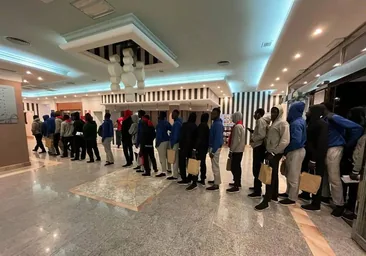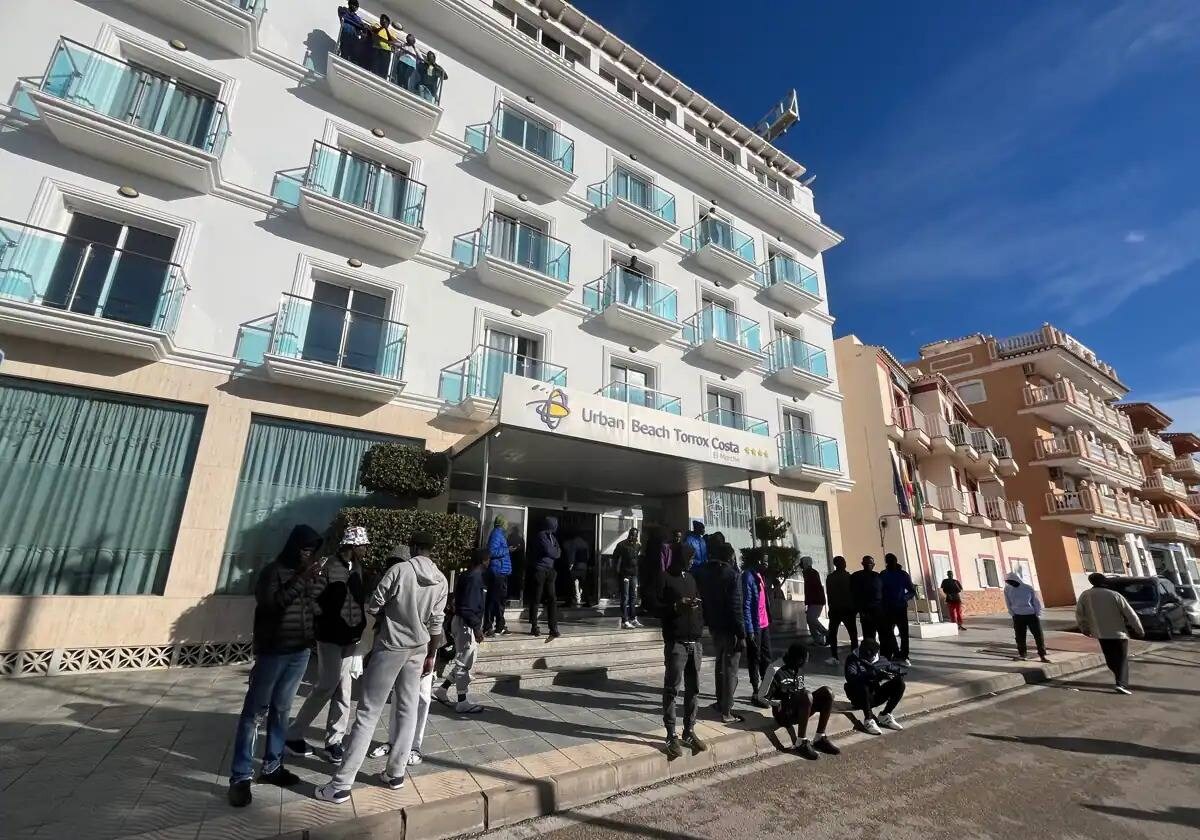‘The mafia boss who took us to the Canary Islands in a small boat cut my arm with a machete and robbed me’
Lassano Danioko, one of the 260 migrants from Mali staying at the Urban Beach hotel in El Morche, Torrox-Costa, talked to SUR about his 19-day journey to reach Fuerteventura
Eugenio Cabezas
Torrox-Costa
Friday, 12 January 2024, 13:19
"When we were approaching Fuerteventura, one of the bosses in the boat threatened us with a machete to rob us all of our passports and money. As I resisted at first, he cut my arm". With these words, Lassano Dianoko, a 30-year-old from Mali, explained to SUR on Wednesday 10 January, his experience during the crossing from his hometown of Kakoy. "I only managed to keep my mobile phone, they took all the money I was carrying and my passport,” he said.
Along with Lassano, 259 other African migrants are staying at the Urban Beach Hotel in El Morche, Torrox-Costa, where they arrived early on Wednesday morning by bus from Madrid. They were flown from the Canary Islands to the city by Spain’s central government, as a new record in the number of migrants have been arriving to the Spanish archipelago.
This time all the men staying in El Morche are originally from Mali. Dianoko explained to this newspaper that he left his country and crossed Mauritania and Morocco, until he reached Western Sahara, where he was able to get on a boat. It then took five days to reach Fuerteventura. Lassano says the crossing was "very difficult, everyone was sick, because there were big waves, we were very scared, but luckily, thank God, we all made it there alive".
Work in commerce
Lassano told SUR that he studied Commerce back in Mali and worked as a shop assistant but that “it was not enough to live on". He added, "I have no contacts in Europe, but I would like to stay here in Spain and do the same job", he said in French. Marc, one of the Red Cross volunteers who are assisting the migrants in El Morche translated Lassano’s words as well as those of other migrants who were also keen to share their experiences.
The Red Cross has pointed out that these migrants are "in an irregular situation" in Spain the Interior Ministry has ordered their deportation. However, in almost all cases, it is not possible to repatriate the migrants immediately because their countries of origin do not recognise them and do not want to accept responsibility for them. The Red Cross gives advice on contacting family and/or friends and provides them with food and clothing for a month, which is paid for by the Ministry for Migration.
The migrants are free to move around Spain and Europe. However, they still have to wait at least a year before they can obtain documentation that allows them to work in Spain, which is the minimum legal period established by the law for foreigners to obtain a residence permit. This is why many migrants are forced to work illegally and end up involved in illegal street vending, so-called 'top-manta', because they sell things on a blanket (manta), or in agriculture, according to the Red Cross.
An open town
Mayor of Torrox, Óscar Medina thanked the Red Cross for the work carried out with the migrants and highlighted "the absolute absence of incidents" with local residents. He reiterated the "unfortunate and unacceptable" words of his councillor for culture and popular traditions, Salvador Escudero, who compared the migrants to animals and said on local radio in October, when the first migrants arrived in the town: "We don't know if they are going to steal a car, it's like putting a time bomb on you".
Medina has expressed his “solidarity” with the Canary Islands as they deal with a new wave of migrants and wished "the migrants the best of luck". He said he hopes “the Spanish government, together with the European Union, will solve the issue of illegal migration".
He concluded, "Torrox, as an open town that has more than a hundred nationalities on its census, will once again rise to the occasion.”

